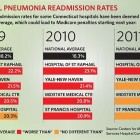Fines & Sanctions
State Hospitals Face 2nd Highest Rate Of Federal Penalties Nationwide
|
Connecticut fared second-worst in the country in the percentage of hospitals hit with federal penalties for selected quality-of-care measures and in the overall rate of loss of Medicare reimbursements associated with those penalties, new federal data shows. Eighty-six percent of the state’s 30 acute-care hospitals were penalized under Medicare’s Value-Based Purchasing Program, an incentive program created under the Affordable Care Act to reward hospitals on a number of quality measures related to treatment of patients with heart attack, heart failure, pneumonia and certain surgical issues, as well as patient satisfaction. Overall, the state’s hospitals lost .15 percent of their Medicare reimbursement, compared to a .02 percent average loss nationally, the data shows. In addition to the penalties on quality measures, 23 Connecticut hospitals lost Medicare funding because of high rates of readmitting patients within 30 days of a hospital stay. Four faced the maximum loss, a 1 percent reduction in funding: Griffin Hospital in Derby, the Hospital of St.
